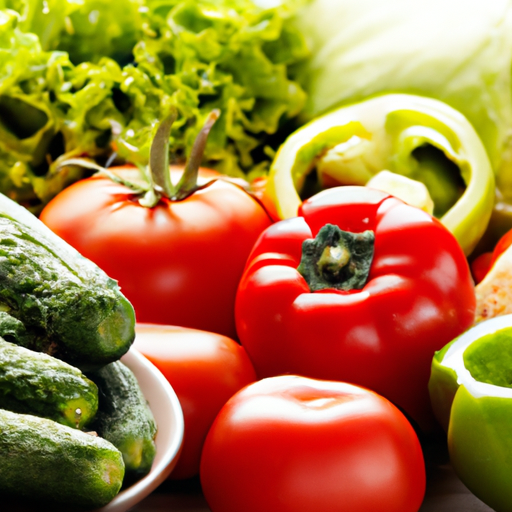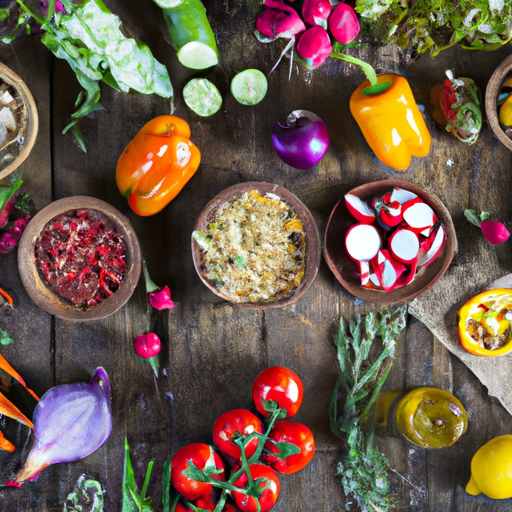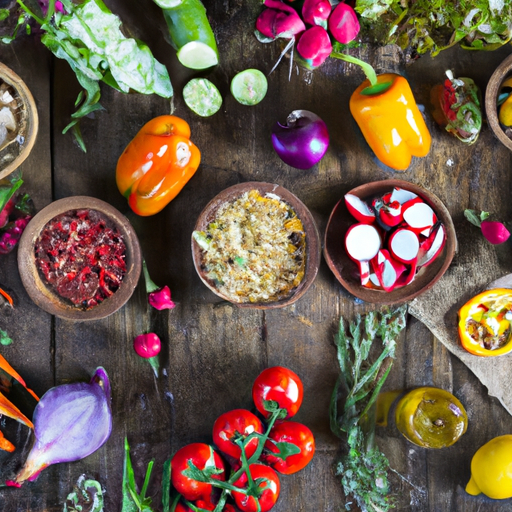So, you’re considering going vegetarian or maybe you already are one, but you can’t help but wonder, are there any risks associated with a vegetarian diet? Well, let me tell you, there’s a lot to consider when it comes to your dietary choices. On the surface, a vegetarian diet can seem incredibly healthy and beneficial for both your body and the planet. But like with any eating plan, there can be potential risks and challenges that you need to be aware of. Don’t worry though, I’ve got you covered. In this article, we’ll dive deep into the topic and explore the potential risks associated with a vegetarian diet, so you can make informed decisions about your health and wellbeing. Trust me, you don’t want to miss out on this valuable information.
Potential Nutritional Deficiencies
A vegetarian diet can provide numerous health benefits, but it also has some potential risks. One of the main concerns is the risk of nutritional deficiencies. When following a vegetarian diet, it’s important to ensure that you are getting all the necessary nutrients to support your overall health and well-being. Here are some potential nutritional deficiencies you should be aware of:
Iron Deficiency
Iron is crucial for the production of red blood cells and the transportation of oxygen throughout the body. However, plant-based sources of iron, such as lentils, spinach, and tofu, are not as easily absorbed by the body as animal-based sources. This means that vegetarians may be at a higher risk of iron deficiency.
To prevent iron deficiency, it’s important to consume iron-rich foods and pair them with vitamin C-rich foods to enhance the absorption of iron. Examples of vitamin C-rich foods include citrus fruits, bell peppers, and tomatoes.
Protein Deficiency
Protein is essential for muscle growth, repair, and overall health. While it is possible to get enough protein on a vegetarian diet, it requires careful planning and choosing a variety of plant-based protein sources such as beans, legumes, tofu, tempeh, and quinoa.
To ensure you are meeting your protein needs, it’s important to include a source of protein in every meal and snack. This can be in the form of beans, lentils, nuts, seeds, or plant-based protein powders.
Vitamin B12 Deficiency
Vitamin B12 is primarily found in animal-based foods, and it is essential for nerve function, red blood cell production, and DNA synthesis. Vegetarians who do not consume any animal products may be at a higher risk of vitamin B12 deficiency.
To prevent vitamin B12 deficiency, it’s important to include fortified foods or supplements in your diet. These can include plant-based milks, breakfast cereals, and nutritional yeast.
Impact on Bone Health
Another potential risk associated with a vegetarian diet is its impact on bone health. While a vegetarian diet can be rich in calcium, it’s important to consider calcium absorption and the risk of osteoporosis.
Calcium Absorption
Calcium absorption can be affected by certain dietary factors. For example, oxalates and phytates, which are naturally occurring substances in some plant foods, can bind to calcium and inhibit its absorption. This means that even if you consume sufficient amounts of calcium, your body may not be able to absorb it effectively.
To enhance calcium absorption, it’s important to consume calcium-rich foods alongside vitamin D-rich foods. Vitamin D helps the body absorb calcium and plays a crucial role in bone health. Good sources of vitamin D include sunlight, fortified plant-based milks, and supplements.
Osteoporosis Risk
Osteoporosis is a condition characterized by weakened bones and an increased risk of fractures. Since a vegetarian diet can limit the intake of certain nutrients involved in bone health, such as calcium and vitamin D, vegetarians may be at a higher risk of developing osteoporosis.
To reduce the risk of osteoporosis, it’s important to ensure an adequate intake of calcium, vitamin D, and other bone-supporting nutrients. This can be achieved by consuming a variety of calcium-rich foods like leafy greens, tofu, almonds, and sesame seeds.

Insufficient Omega-3 Fatty Acids
Omega-3 fatty acids are essential fats that play a crucial role in brain health, heart health, and reducing inflammation. While they are commonly found in fatty fish, vegetarians may need to pay extra attention to ensure they are getting enough omega-3s.
Importance of Omega-3s
Omega-3 fatty acids, specifically docosahexaenoic acid (DHA), are important for brain development and function. They have been linked to a reduced risk of cognitive decline, depression, and anxiety.
Since plant-based sources of omega-3s, such as chia seeds, flax seeds, and walnuts, provide mainly alpha-linolenic acid (ALA), which the body needs to convert to DHA, vegetarians may have a lower conversion rate of ALA to DHA. This means that vegetarian diets may not provide sufficient amounts of long-chain omega-3 fatty acids like DHA.
Sources of Omega-3s in Vegetarian Diets
To enhance your intake of omega-3 fatty acids, it’s important to consume plant-based sources and consider supplementing with algal oil, which is derived from algae and provides a direct source of DHA.
Good plant-based sources of omega-3s include chia seeds, flax seeds, hemp seeds, walnuts, and seaweed. Incorporating these foods into your diet can help ensure you are getting an adequate amount of omega-3 fatty acids.
Increased Risk of Mental Health Issues
A vegetarian diet has been associated with a higher risk of mental health issues such as depression and anxiety. While the exact reasons for this association are not clear, it’s believed that certain nutrient deficiencies in vegetarian diets may play a role.
Depression and Anxiety
Research suggests that deficiencies in certain nutrients commonly found in animal-based foods, such as omega-3 fatty acids, vitamin B12, iron, and zinc, may contribute to an increased risk of depression and anxiety.
To support your mental health on a vegetarian diet, it’s important to pay attention to these nutrients and ensure you are meeting your requirements through food sources or supplements.
Poor Cognitive Function
In addition to depression and anxiety, some studies have also linked vegetarian diets with poorer cognitive function. It’s important to note that not all studies have drawn the same conclusion, and more research is needed to fully understand the potential impact of vegetarian diets on cognitive function.
However, it’s clear that certain nutrients, such as omega-3 fatty acids and vitamin B12, play a crucial role in brain health and cognitive function. Therefore, it’s important to ensure you are getting enough of these nutrients through plant-based sources or supplements.

Challenges with Eating Out
Following a vegetarian diet can sometimes make eating out a challenge. Many restaurants may have limited options or lack variety when it comes to vegetarian dishes.
Limited Options in Restaurants
While vegetarian and vegan options are becoming more widely available, it can still be difficult to find suitable choices, especially in certain regions or types of restaurants. Vegetarians may often find themselves limited to a few basic options or side dishes.
To navigate this challenge, it’s helpful to research and plan ahead before dining out. Look for restaurants that specifically cater to vegetarian diets or offer customizable options where you can create a vegetarian meal based on available ingredients.
Hidden Ingredients
Even when vegetarian options are available, it’s important to be aware of hidden ingredients that may contain animal products. Some sauces, dressings, and condiments may contain animal-derived ingredients like gelatin, anchovies, or Worcestershire sauce.
When dining out, don’t hesitate to ask your server about the ingredients used in a particular dish. It’s also a good idea to inform the restaurant staff about your dietary preferences and restrictions to ensure that your meal is prepared accordingly.
Potential Weight Gain
Contrary to popular belief, a vegetarian diet is not automatically a guarantee of weight loss. In fact, if not properly planned, a vegetarian diet can lead to weight gain and poor health outcomes.
High Carb Consumption
Many vegetarian dishes, such as pasta, bread, rice, and potatoes, are high in carbohydrates. While carbohydrates are an important source of energy, excessive consumption can lead to weight gain, especially if the overall calorie intake exceeds your energy needs.
To maintain a healthy weight on a vegetarian diet, it’s important to focus on whole, minimally processed foods and incorporate a balance of macronutrients, such as protein, healthy fats, and complex carbohydrates, into your meals.
Low-Quality Vegetarian Foods
Just because a food is vegetarian doesn’t mean it’s automatically healthy. Packaged vegetarian foods like veggie burgers, frozen pizza, and cookies can often be high in unhealthy fats, added sugars, and sodium.
It’s important to choose whole, nutrient-dense foods as the foundation of your vegetarian diet. This means incorporating plenty of fruits, vegetables, whole grains, legumes, and plant-based proteins into your meals.
Lack of Variety in Diet
Following a vegetarian diet can sometimes lead to a lack of variety in food choices, particularly when it comes to protein sources. Without careful planning, vegetarians may find themselves relying on only a few staple foods and missing out on the benefits of a diverse diet.
Limited Protein Sources
Animal-based foods are often rich sources of protein. When following a vegetarian diet, it’s important to explore a wide range of plant-based protein sources to ensure you are getting all the essential amino acids.
Incorporating a variety of protein-rich foods like beans, lentils, tofu, tempeh, quinoa, and plant-based protein powders can help diversify your protein intake and ensure you are meeting your nutritional needs.
Monotonous Food Choices
Eating the same foods day after day can quickly become monotonous and lead to boredom with your vegetarian diet. This lack of variety may make it harder to stick to the diet in the long run and may increase the temptation to rely on less healthy options.
To keep your vegetarian diet interesting and enjoyable, experiment with different recipes, flavors, and cuisines. Explore new vegetables, whole grains, herbs, and spices to add variety and excitement to your meals.
Social Challenges
Following a vegetarian diet can sometimes present social challenges, particularly when attending gatherings, events, or dining with friends and family who may not understand or accommodate your dietary choices.
Difficulty Finding Suitable Options in Social Gatherings
When attending social gatherings, it can be challenging to find suitable vegetarian options, especially if the event is centered around meat-based dishes. It’s important to communicate your dietary needs to the host in advance and offer to bring a vegetarian dish to share.
If it’s not feasible to bring your own dish, focus on consuming the vegetarian options available, such as salads, vegetables, and grains. You can also eat a meal or snack before attending the event to ensure you’re not left hungry.
Increased Risk of Nutrient Toxicity
While nutritional deficiencies are a concern for vegetarian diets, it’s also important to consider the potential risk of nutrient toxicity. Certain nutrients, when consumed in excess, can be harmful to your health.
Iron Overload
Iron toxicity is a potential risk for individuals who rely heavily on iron-fortified foods or supplements. Excessive iron intake can lead to digestive issues, organ damage, and other health complications.
To prevent iron overload, it’s important to monitor your iron intake and consult with a healthcare professional to determine whether iron supplementation is necessary.
Excessive Selenium Intake
Selenium is an essential mineral that plays a crucial role in the body’s antioxidant defense system. However, excessive selenium intake can lead to toxicity and cause symptoms such as hair loss, brittle nails, and GI disturbances.
To avoid excessive selenium intake, it’s important to be mindful of your selenium sources. While Brazil nuts are known to be high in selenium, consuming them in moderation is recommended to prevent excessive intake.
Conclusion
While a vegetarian diet can provide numerous health benefits, it also comes with potential risks. Nutritional deficiencies, impact on bone health, insufficient omega-3 fatty acids, increased risk of mental health issues, challenges with eating out, potential weight gain, lack of variety in the diet, social challenges, and increased risk of nutrient toxicity are among the risks associated with a vegetarian diet.
To minimize these risks, it’s important to plan your vegetarian diet carefully, paying attention to your nutrient intake, and ensuring you are getting all the necessary nutrients through a variety of plant-based sources or appropriate supplements. By being mindful of these risks and taking steps to address them, you can enjoy the health benefits of a vegetarian diet while minimizing any potential drawbacks.
